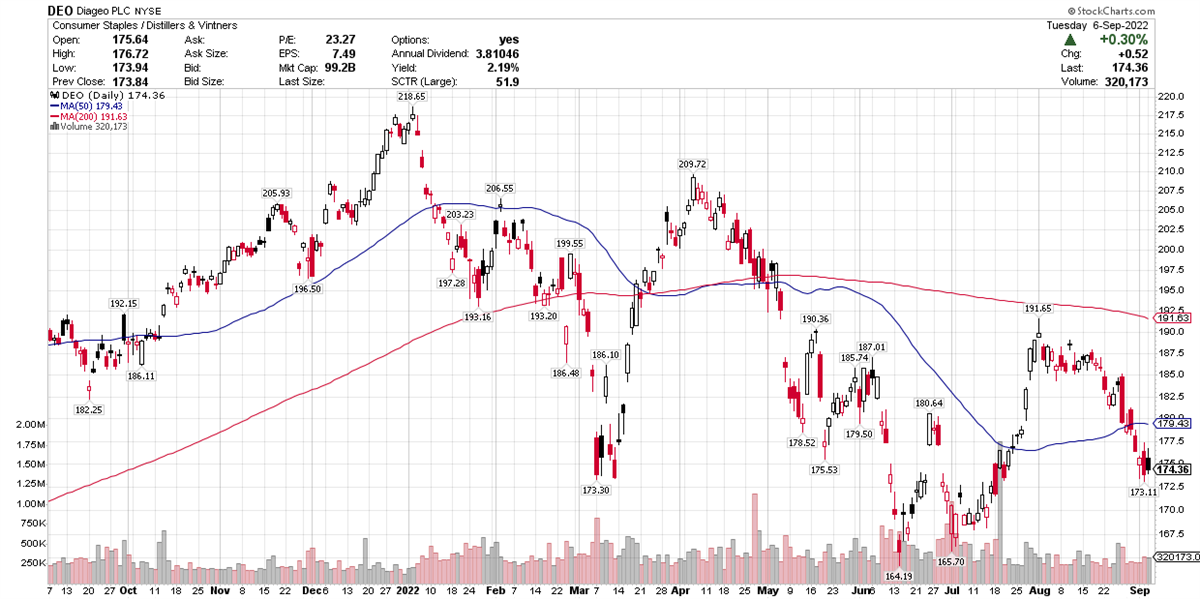A new Bank of America report cites Diageo (NYSE:DEO) and Pernod Ricard (OTCMKTS:PRNDY) as U.S.-listed alcoholic beverage companies expected to show resilience even in a weak consumer environment.
Both stocks are showing year-to-date declines, as well as losses over shorter time frames.
Meanwhile, other companies, such as Brown-Forman (NYSE:BF.B) , Constellation Brands (NYSE:STZ) and Molson Coors (NYSE:TAP.A) are showing signs of life.
Q2 2022 hedge fund letters, conferences and more
Bank of America analysts Andrea Pistacchi and Victor Beltran-Segarra see the global alcoholic beverage industry growing sales by 5.6% in fiscal 2023, despite lower-than-expected year-to-date performance.
They added that they expect 4.6% growth in the U.S. market.
“In Asia, China should accelerate on easy comps and potential easing of zero-tolerance Covid policy, while the rest of the region is rebounding strongly,” they wrote.
The recovery of the travel industry should also aid in the global beverage bounce. In the U.S., the analysts pointed out, at-home alcohol spending accounts for just 1% of Americans’ total income, but adult beverages are “a relatively ‘affordable pleasure’ for most … suggesting it will be among the last purchases consumers will sacrifice.”
Moreover, the report said, two-thirds of alcohol spending in the U.S. comes from households earning more than $75,000 per year. That could bode well for sales, if higher earners continue to spend disposable income on alcohol.
Despite the Bank of America analysts’ optimism about fiscal 2023, and the strength of the well-paid consumers, high inflation and rising energy costs may impede consumer demand for the foreseeable future.
Double-Digit Sales Growth
U.K.-based Diageo has increased sales at double-digit rates since March 2021, but growth has been slowing. Earnings, too, were increasing at double-digit rates, but growth was flat most recently.
Wall Street expects earnings to grow 15% in fiscal 2023, to $8.30 per share, and then another 9% in 2024, to $9.05 per share.
According to MarketBeat data, analysts have a consensus rating of “hold” on Diageo. The stock has been correcting since January. It closed Tuesday at $174.36, up $0.52, or 0.30%. The stock gapped up earlier in the session, but reversed to close near its session low.
It’s currently trading below key moving averages, which doesn’t bode well for investors hoping to get in just as the stock is about to make a big price move.
Diageo owns 200 alcohol brands, sold in more than 180 countries. Brands include Johnnie Walker, Guinness, Tanqueray, Bailey’s, Smirnoff, Captain Morgan, Crown Royal and Ketel One.
Top Pick As Economies Recover
In the beverage report, Bank of America said its top pick was Pernod. Analysts cited reasons including a China and travel recovery, the company’s balance sheet and attractive valuation. Pernod has a market capitalization north of $48 billion, but as a France-based company, it’s not tracked by the S&P 500.
Pernod’s well-known brands include Jameson, Glenlivet, Chivas and Beefeater, among many others.
Like Diageo, Pernod has also been selling off since early January. A rally attempt in April fell flat, and the stock has been selling off along with the broader global market, following the summer rally throughout equity markets.
Earnings and sales both picked up in recent quarters, following slowdowns in 2020, as the company was clearly hit hard by Covid closures of bars, restaurants and other out-of-home venues.
This stock, too, is underperforming the broader market, as well as languishing below longer-term price lines, such as the 50-day or 200-day, as well as shorter term averages.
In an economic downturn, consumers often turn to lower-cost alternatives. That’s true in many product categories, including alcohol. Bank of America calls that phenomenon “trading down.”
The Bank of America analysts said Pernod’s U.S. portfolio “should be relatively shielded from trading down, except for a few smaller brands.
The main growth drivers have limited exposure to lower-income consumers (Jameson, The Glenlivet, Jefferson's) or are attractively priced (Malibu). Moreover, a large portion of Pernod's U.S. growth is coming from specialty brands that still have plenty of white space for growth.”
Despite a “buy” rating on the stock, as you can see on the MarketBeat analyst data page, and some future potential, it’s generally best to avoid a stock that’s currently in the midst of a correction.
7 Blue-Chip Dividend Stocks That Won’t be Impacted by Rising Interest Rates
Stock markets move in cycles. Historically, bull markets last longer than bear markets, but both can last longer than investors expect.
But inside bull markets and bear markets, there can still be volatile price changes in the opposite direction. And when the market does reverse direction, the biggest gains are made by investors that stay the course.
In a volatile market, one option for staying the course is to invest in quality blue-chip dividend stocks. Blue-chip stocks are companies that have a large market capitalization. That means there are companies in mature industries.
That maturity allows these companies to deliver consistent performance that is independent of whatever is happening with the country's monetary policy. When interest rates fall, these companies are poised for growth.
And when interest rates rise, these companies have strong balance sheets that allow them to maintain pricing power and profits to provide stability.
All of this means that investors with lower risk tolerances can stay in the market without having to give up on growth. And in this special presentation, we're giving investors seven blue-chip names that investors can buy with confidence no matter what is happening with interest rates.
View the "7 Blue-Chip Dividend Stocks That Won’t be Impacted by Rising Interest Rates".
Article by Kate Stalter, MarketBeat







